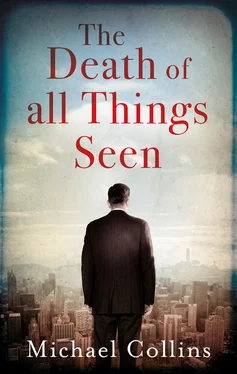The Daycare sister-in-law was down in the basement with Mrs Sanchez and the grandmother. Norman went down. They were apparently taken with the spaciousness of the unfinished basement, but there was a fetid odor of mildew. It was discussed in Spanish and then English, and relayed to the realtor who arrived and wrote down notes on a sheet attached to a clipboard.
The son followed and tapped the faux wood paneling Walter had installed to disguise a poorly installed drywall. A chalky dust powdered the baseboard. The son bent and ran his finger along a line of fine dust in a manner Norman prejudicially aligned with a dealer checking the quality of cocaine. Evidently, the Mexicans had their own plans for the basement, a remodel.
In the unfinished laundry room, Norman turned on the only tap not running in the house, just to show some genuine and competing interest.
The son had an industrial-sized yellow tape measure. He took a series of measurements. The conversation continued, conducted in Spanish, then in English when the realtor was asked a question. There was talk of a daycare unit, or that is what Norman gathered, the realtor unsure of the legality of permits. He thought she was scuttling his prospects and again, he had to refrain from saying anything.
The grandmother fingered rosary beads, her mouth moving in a prayer of providence. She said the word, ‘Daycare’. Seemingly, there was no word for it in Spanish, or maybe the concept only existed in English.
It appeared that the son was planning to take care of the remodel himself. He made some more provisional measurements and wrote them down in a spiral notebook.
Norman stood amidst the dank limestone drip of unfinished walls in the laundry area. A smell of bleach clotted the air. He could see, across the basement, the crawlspace. He was mindful of what was still there — his bundle of porn magazines.
He felt a great shame in all that had passed. The basement would now become the center of a daycare business, this basement where he had jacked off and where Helen, too, in her failing years, had faithfully watched Judge Judy , becoming an expert in small claims cases, fence line disagreements and overhanging trees, in the likelihood that you could sue and win over a bad haircut, and affirmed in her belief that you should always take pictures and bring at least two legitimate estimates to court. This had been the end of her days.
With his mother, Norman conceded that there had always been the sense of a mind that had never settled on what she had wanted or on what she could have been.
In thinking it just then, Norman forgave her.
The Mexicans moved eventually through a double-door of paned glass to the patio and the garden. The double garage out back had a set of prized die-cast tools his father had owned and an air-compressor unit. The son wanted the tools included as part of an offer.
The mother, when she had otherwise been speaking Spanish, announced in perfect English that she wanted the furniture, too, the beds, the linens, the curtains, everything .
*
The realtor had done Norman no favors. No wonder there had been so little interest. He was by his parents’ bedroom along a hallway. Helen’s medicines were beside her bed, along with a glass of water dried to a hoary calcified coating.
It was Norman’s failure, not doing what a son should have done, gone out there at least once. It was easier to blame the realtor.
Norman felt a grave and sudden loss. It felt like home again, and all that it meant.
A wind-up clock in the hallway, a Woodland songbirds clock bought at Lake Geneva so long ago, had stopped at 4.15, either a.m. or p.m. Time had ended in their absence.
Norman remembered the trip gained for the correct answer in a write-in answer contest for a talk show where the result was read from the flick of card, in the index of answers read over the air, the sound of each answer, each card, the anticipation.
The win had included a romantic cruise around the lake and dinner for two. There was a picture somewhere of Norman in a nautical cap. The man who had invented the foil that went on the tops of old milk bottles had a mansion on the lake. It was his one invention. There was no envy, just a providence of luck. A house like that was always just one good idea away.
They stalked Norman suddenly, his parents. He took the songbird clock key, felt the key in the heart of the gears, turned it, felt the tremor of movement.
What was time, in a home without the quiet tick tock of Eternity, a feeling lost to a digital age of clocks with their buzzers, time, a bully of responsibility, and not something felt and experienced?
Joanne came out of Norman’s bedroom with Grace. She pointed to a poster on the bedroom wall. She said, ‘I would never have pegged you as a Star Wars fan.’
Norman said, ‘I was in love with Harrison Ford.’
Then he smiled and Joanne smiled.
The realtor ascended from the basement and seemed concerned about the billow of steam gathering in the bathroom. She said tentatively, ‘The windows are painted shut.’
It was a strike against the house, then she added, ‘But the shower pressure is strong.’
Norman confided, ‘There’s a vent above the window.’ He caught the realtor off-guard, and then she suddenly understood. He went into the bathroom and opened the vent.
A fan whirled in a funneling suck of air like the house needed to exhale.
IMMENSITY WAS THE mistress of all. This Nate understood in his aloneness against the advance of his own passing, and yet there was hope in the remotest of places, something more readily apparent when facing the anonymity of a world outside a hotel window. Nate had the run of it in his head, what he would do after Norman Price stopped banging on his hotel room door at The Drake.
He would put his trust in the socialism of the Canadian healthcare system and not in the Philippines. He knew it better, Canada, the Wild, where, for years, industries had always flourished, then petered, where life was never a certainty.
He could better navigate this unknown. This is what he knew, the assumed history, first the natives, then the trappers, then men come up from the south in search of quick fortunes in the mines and forestry, and nearly all finding, eventually, the summer too clotted with black flies, the winter too cold and long, and the wages not profitable in the way they had anticipated. He felt the flux of hardship in the mere conjuring of it, this history.
There were the most desperate always, the newly arrived on the continent. Of the immigrants, though, in the latter part of the twentieth century, few did not know the hazards of the North, so the Canadian North became the province of men like Nate Feldman, men escaping civilization for any number of reasons — the law mostly — men who settled with the understanding wages were paid through a system of credit at a company store, so there was little real saving, and those who came were consigned that this was the best it would get, this allotted freedom, when it might not have been secured elsewhere, so they were safe from the reach of the law and bureaucracy of provincial and federal governments.
You could not take a picture when Nate Feldman arrived in Grandshire, because of the native superstition that, in doing so, you captured a soul. Ostensibly, it was the reason given, when it was more about eluding the law, so there was no definitive identification of who existed up there. It predated, of course, the proliferation of cell phones, this willful and respected détente between authorities, that this life up there was perhaps banishment harder than prison, but, on one’s own terms.
Of course, it had changed, the largesse of a natural bounty, the great wealth of resources, with the emergence of fracking, the advent of chipboard and plywood, the resurgence of new growth cutting, the rise of impermanence and the lightness of life, in the way a house might now be furnished in faux-wood-finish panels, a kit assembled with an Allen wrench, in a world where there were no longer heirlooms, where nothing lasted, and everything needed to be made, or made again, recycled and rebought, and this constituted the illusion of progress.
Читать дальше












